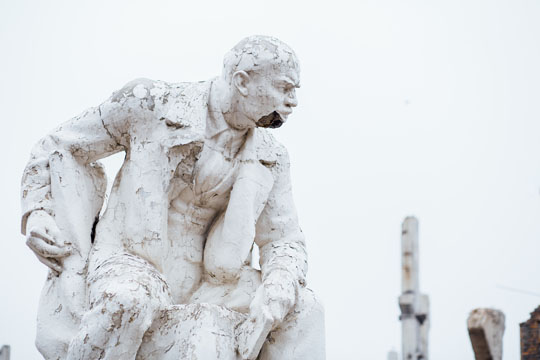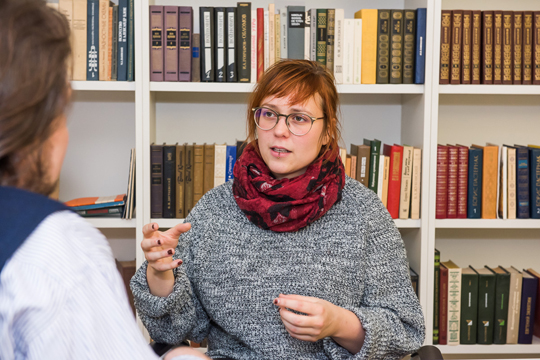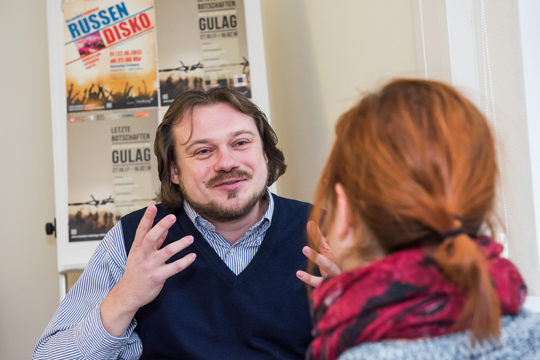Revolutionary Resonance
Freiburg, Nov 08, 2017
The Russian Culture Days in Freiburg offer new insights not only into aspects of theater, music, art and films – academia is also on the hunt for knowledge: at a conference on the subject of “100 Years of Russian Revolutions” young researchers are investigating the effects of the epoch-making event in Russia, Germany and the rest of Europe. The “Cultural transfer and ‘cultural identity’ – German-Russian contact in a European context” conference is being organized by the International Research Institute (IRI). What makes this unusual is that the IRI brings together German and Russian PhD students – so do different cultural world views and backgrounds color their perception of the revolution? Hans-Dieter Fronz met Freiburg PhD student Anna Sator and Moscow literature scholar Dr. Jurij Lileev for a chat.
 Battered memorial: the remains of a statue of Vladimir Ilyich Lenin – the most prominent founder of the Soviet Union.
Battered memorial: the remains of a statue of Vladimir Ilyich Lenin – the most prominent founder of the Soviet Union.
Photo: photominus21/Fotolia
Ms Sator, you are speaking at the conference on the subject of gender, culture and revolution in Berta Lask’s “Liberation”. Does the lecture relate to your dissertation?
Anna Sator: Yes. I am working on constructions of gender in German-language travel journals in the Soviet Union between 1917 and 1933. Berta Lask is one of the authors whose travel journal I am researching.
 Anna Sator finds it especially interesting to see which artistic responses to the Russian Revolution failed to make it into the literary canon.
Anna Sator finds it especially interesting to see which artistic responses to the Russian Revolution failed to make it into the literary canon.
Photo: Klaus Polkowski
Mr Lileev, your lecture is titled “The Alien in the Familiar: Rilke’s perception of the Russian Revolution”. Could you explain your theme to us?
Lileev: I will be speaking about Rainer Maria Rilke’s changing perception of the Russian Revolution. In 1917 he was briefly extremely enthusiastic and euphoric, but this mood passed quickly. He read a book by one of Fyodor Dostoevsky’s daughters, who presented the revolution as something utterly foreign to the Russian soul. And he adopted this view.
Sator: After the First World War, however, the diametrically-opposed view prevailed in the right-wing populist scene in Germany. Here, the Russian Revolution was seen as an inevitable consequence of the supposed Russian soul. A populace with bossy women, who were already feared in the First World War as gunwomen at the Front – nothing good could come of it, anarchy was certainly programmed in from the start.

Deep traces in literature: even poets who were not really politically engaged took the Russian Revolution as a theme for their work, explains Jurij Lileev.
Photo: Klaus Polkowski
The conference takes as its theme the Russian Revolution and the upheavals that followed, however it also poses the question of its reception in Germany and in Europe. A broad field …
Sator: True. As regards its reception, I find it especially exciting to see which responses were discarded in retrospect. Berta Lask’s dramas, for example, her agit-prop pieces and her functional type of theater did not make it into the literary canon. So there is a lot to discover there: where and why did these responses get lost, which in their time had significantly shaped the picture of the Russian Revolution in people’s minds?
Lileev: Also, the Russian Revolution wasn’t just a political event but triggered many new things in the field of culture too. For instance, avant-garde art was powerfully inspired by it. This influenced many artists in the west as well. I’m thinking of Vladimir Mayakovsky or Sergei Eisenstein, for example, who set standards for film art.
Sator: The example of the Bavarian republic of councils comes to mind, which was clearly in response to the Russian Revolution. It involved many literary types, who, with their idealism, attempted to create a kind of poets’ republic of councils. Transferal processes took place from art to politics and society and vice versa – in strict relation to the revolution in Russia.
Could it be said that art and culture at this time were themselves political?
Lileev: Exactly. Even poets who were not really politically engaged took the Russian Revolution as a theme, for example in the poem “The Twelve”, by the symbolist Alexander Blok. It was, so to speak, in the air. A central theme at the school is identity and the search for identity. The Russian Revolution was something like the founding myth of a new identity, which then was also aestheticized.
Sator: But it wasn’t just about a national, Russian identity, but an international identity. It was about a new humanity.
Lileev: And it is interesting to see that the quasi-religious claims of this revolutionary movement distanced itself from all received standards, not only in politics, but also in the field of aesthetics, in order to make a new beginning. Take for example Kazimir Malevich’s “Black Square”. The artist placed the picture in an exhibition literally in the vacant space where an icon of Christ the Redeemer had hung.
Listening to the two of you talking like this I get the impression of broad agreement. So is the exchange of knowledge between East and West, Russia and Germany, otherwise so successful?
Sator: Well, in our school it certainly is. But as far as I am aware, there are only two schools like this in the whole of Europe; so there is a lot of room for improvement. So I as a German can benefit even more from the exchange with my Russian colleagues. Which is after all also an exchange of world views, because I approach these themes from a totally different background.
Is cultural background significant to the perception of history? For instance, have impressions from the Soviet era in the time following the revolution passed down to you, Mr Lileev?
Lileev: Naturally, even though the Soviet era and the revolution are fading further into the past. Today, for instance, we don’t even have a public holiday to remember the revolution. And yet the anniversary of the revolution brings up phenomena such as an installation at the Winter Palace in Saint Petersburg, where the mottoes of the revolution have been hung up on red banners as beautiful aesthetic facades on the wall. It is “in” again, to talk about the revolution, even amongst the younger generation. There’s even an app to download, called “1917 Revolution live”. It’s a kind of Social Network, with posts, but also with videos and information about individual historic characters.
The same question for you, Ms Sator: do cultural, mental differences have an influence on how someone judges historic events?
Sator: I think so. I think that we in the West deal with the theme of the Russian Revolution more impartially, because we simply weren’t and aren’t so directly affected by the events. This impartiality offers potential, but it also means there is a risk of misjudgment. That’s precisely why it’s good as well as important to exchange ideas with the Russian side: to compare one’s own picture with theirs.

